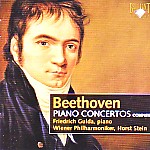Beethoven’s 1970 bicentennial ushered in a slew of recordings, including a piano concerto cycle from Decca featuring soloist Friedrich Gulda with the Vienna Philharmonic under Horst Stein’s direction. The still-impressive sonics convey a wide dynamic range, a reverberant concert-hall realism, and an ideal soloist/orchestra perspective. However, the performances vary. While the Emperor’s crucial timpani passages ring out loud and clear, the otherwise generalized orchestra textures supply a rather ordinary backdrop for Gulda’s inconsistent solo work, which can be chilly and uninflected (the Adagio) or vehement to the point of sloppiness (the Rondo).
A brisk and vibrant Rondo proves the Fourth concerto’s high point, following a bland first movement and a draggy Andante con moto (the shapeless, indecisive pizzicatos hurt). By contrast, the performers play fast, loose, and even aggressively in the Third concerto, highlighted by a brisker, more chamber-like Largo than usual. The Second Concerto’s Rondo transpires at something less than Beethoven’s rabble-rousing Molto Allegro, yet Gulda’s crisp and lithe articulation makes it work.
The Vienna woodwinds strut their stuff most persuasively in the First concerto’s outer movements, while the strings’ combination of sweet tone and discreet vibrato foreshadow today’s historically informed paradigm in its most intelligent, least mannered manifestations. The longest of Beethoven’s three first-movement cadenzas inspires Gulda to run wild, and I can’t help but wonder if the pianist’s jazz proclivities had any bearing here.
A more recent edition of Beethoven’s increasingly popular piano arrangement of the Violin Concerto fills out this release. Shoko Sugitani’s alternately forthright and poetic shaping of the solo part (infinitely more stylish than Olli Mustonen’s self-serving remake for Ondine) is balanced forward in the mix, but that does not detract from Gerard Oskamp’s solid support. However, the superbly played first two movements are let down by a poky, lethargic Rondo that gets sleepier by the minute. In short, Gulda’s Beethoven is never uninteresting, yet he truly hits home in the earlier works.
































